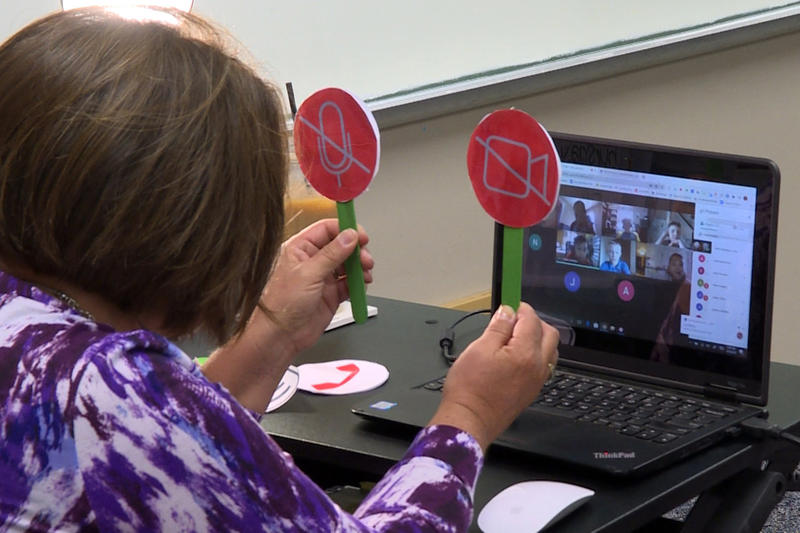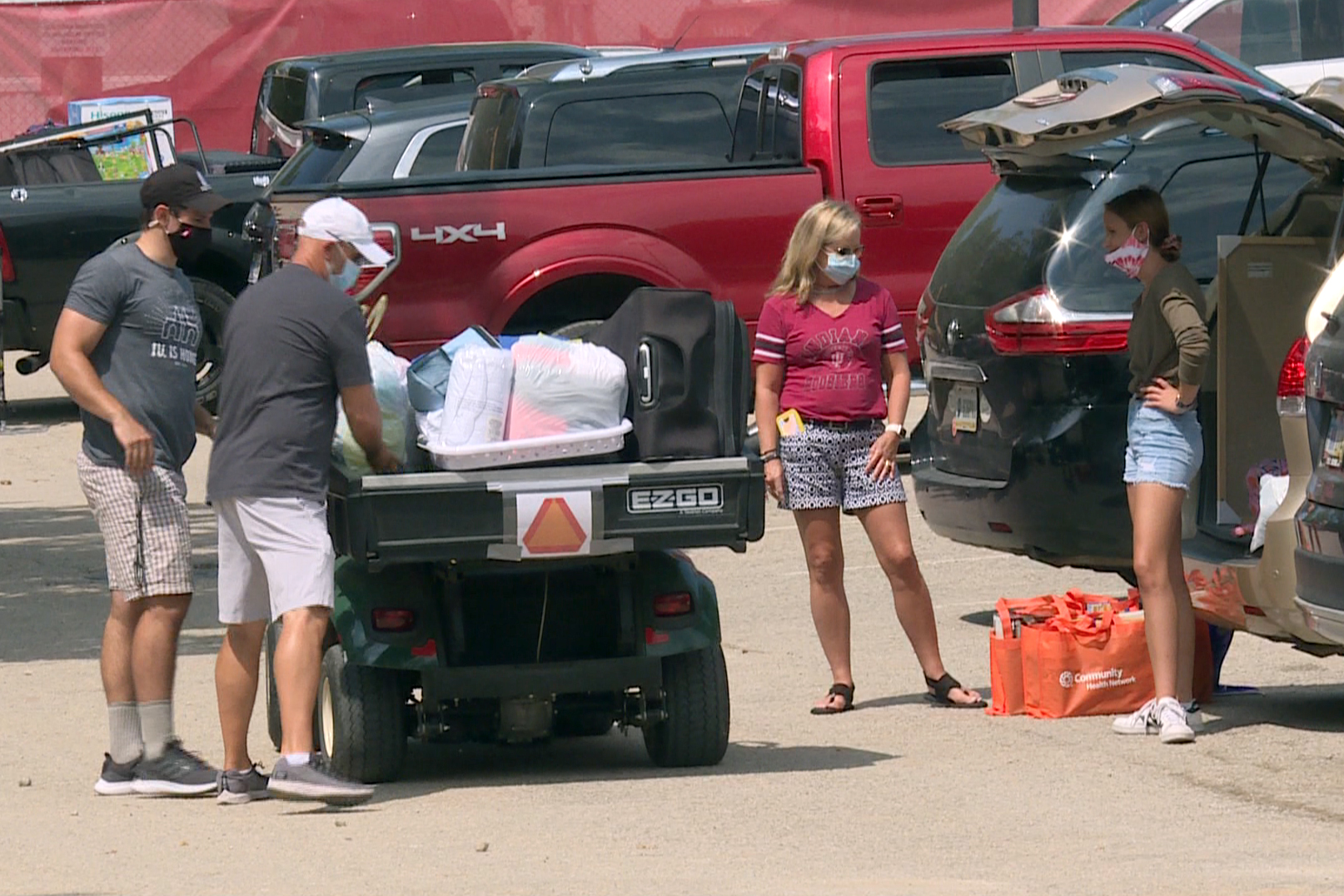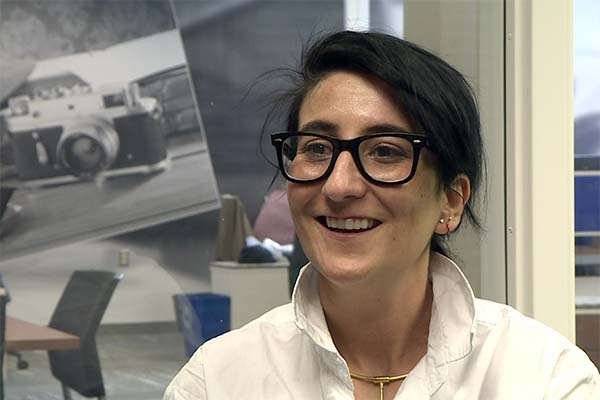
Tami McMahan sits in front of a computer on the first day of school, holding up icons representing the microphone and webcam buttons to help her virtual third grade class see whether they should turn theirs on or off. (Jeanie Lindsay/IPB News)
On the first day back to school at Fairview Elementary, Tami McMahan's classroom sits empty. The only students you'll find in here are on a screen.
"This year, I will be servicing third grade remote kids, all via an online platform," she said.
McMahan's role looks a lot different this year. She's an English Language, or EL, interventionist. Usually, she works with kids who don't speak English as their first language.
"Last year I serviced our newcomers, and those are students that were refugees from Guatemala, El Salvador, Honduras, and they would come to a special class for two hours a day and we would do instruction on how to, you know, just the introduction of school," she said.
The district has gotten into a rhythm working with all kinds of non-native English speaking families over the years. Nearly a third of enrolled students don't speak English as their first language.
But Cass County had one of the largest outbreaks in Indiana at the start of the COVID-19 pandemic, and it changed everything.
The district pushed the start of school back by nearly a week after initially planning to reopen Aug. 12. A school survey over the summer showed about a dozen families interested in learning online; after registration, nearly 600 kids enrolled in online classes.
Curriculum director Lindsey Hagerty said, a lot of them are EL students.
"24 percent of our remote learners are English Language learners," she said.
She said teachers have had to learn how to use online tools themselves – many didn't have much experience using online platforms like Google Classroom so often, or as comprehensively, as they will this year. They also have to make sure kids still learning English can use them too.
State data shows schools graduate EL students at a rate more than 10 percent lower than their native-English speaking peers. That makes additional training – and the time to do it – vital, with language specialists like McMahan now leading online classes of their own.
"I've even had to pull the English learner teacher, the interventionist teacher to now become a remote teacher. What does that do? What effect does that, does that have on students and teachers? It absolutely does have an effect," Hagerty said.
Hagerty says she wants to minimize any negative effects a lack of support staff could have on students; the term "English Language learners" covers a lot – kids who don't speak English don't all speak the same language, like Spanish.
So, Hagerty said, the district built classes for teachers to more easily manage different levels of instruction.
"If I have high ability, I may also have average students and then maybe one or two tiers of English Language learners. So now I'm addressing three levels as opposed to five, six, seven levels of students that I could have had in the past," she said
And while instruction is important, working with families is essential too.
First year junior high counselor Ana Aguirre says many families struggled with the abrupt shift to online learning in the spring. Some didn't have reliable internet, or know how to navigate new online tools. But she says, preparation and communication schools and teachers have done over the summer has helped some.
"I think they know what they're getting into now. Like, if they've chosen remote, they know, they'll have to have an internet connection, that they'll have to be able to be on schedule to get onto their classes," Aguirre said.
But the needs of students go beyond just academics.
Aguirre says she's been preparing activities to emotionally support students in school and remotely. Things like breathing exercises, emotion check-ins, and tips on how to navigate new schedules and homework. She says students missing out on so much social time with their friends and community makes self-care a high priority.
One of her main goals this year is to build relationships – and trust – with families, especially those experiencing a new culture and language, and now, a constantly changing school environment. She was an EL student in Logansport once too.
"I think it's really important because I think a lot of things get lost in translation sometimes," she said.
And there's a lot to translate. Just coming to school, kids go directly to their classrooms instead of gathering in common areas. Students have assigned seats at lunch, and hand sanitizer is everywhere. Not to mention, everyone's wearing a face mask.
Even with all the planning and preparation, the first few days of school will focus on getting everyone – especially kids – on the same page.
For EL teacher turned remote instructor McMahan, it means teaching her third graders how to unmute their microphones and turn on their webcams.
"What could go wrong, you know? It's all going to go perfect, right?" she said, then laughed.
But overall, she says she's ready to take on this new set of challenges with her students, especially if it means coming back to school – whatever that looks like. She says, it just feels right.
"And in a time of a pandemic, when things don't feel right, it felt good to have something feel right," McMahan said.
Contact reporter Jeanie at jlindsa@iu.edu or follow her on Twitter at @jeanjeanielindz.
For the latest news and resources about COVID-19, bookmark our Coronavirus In Indiana page here.










